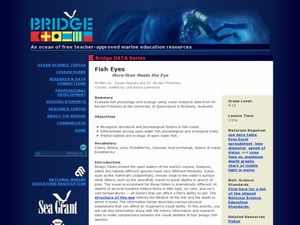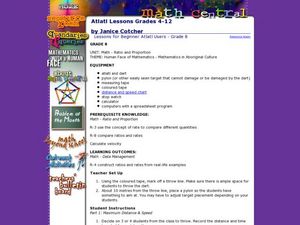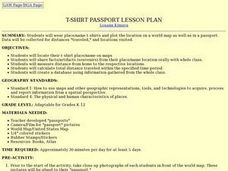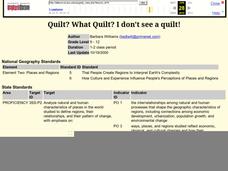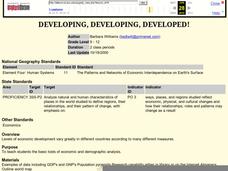National Nanotechnology Infrastructure Network
Understanding Wave Motion - Slinky vs. Snaky: Which Spring is Dominant?
Ride the wave to an understanding of refraction! The first in a series of two inquiry-based lessons challenges learners to create transverse waves with two different types of springs. As their wave hits an object, they observe the change...
Curated OER
What Did it Look Like When Europe Met America?
Students view the film 'Black Robe,' which further develop students' abilities to see an event or era of history from multiple perspectives. After the movie, they utilize worksheets imbedded in this plan to write about what they've seen.
University of Colorado
Are All Asteroids' Surfaces the Same Age?
There are more than 600,000 asteroids in our solar system. Pupils analyze images of two asteroids in order to determine if they are the same age. They count craters for each asteroid and compare numbers.
University of Colorado
Are All Asteroids' Surfaces the Same Age?
Did you know scientists can tell the age of an asteroid by looking closely at its craters? This final instructional activity of a six-part series focuses on two asteroids, Gaspra and Ida, in order to demonstrate the concept of dating...
Curated OER
Light, Colors, and Vision
Third graders experience optic illusions by creating flipbooks. In this optics lesson plan, 3rd graders view a demonstration of the workings of rods and cones using a camera. They are shown an optical illusion and work to create their...
Curated OER
Tracking the Salt Front
Using the Hudson River as the focus, learners discuss the difference between salt water and fresh water environments, analyze maps and graphs, and complete addition and subtraction problems. This activity comes with a wealth of...
Curated OER
Yoga Ball Bash
This line dance lesson involves the use of PE equipment. If you have yoga balls and rhythm sticks then take a look at this lesson. Of course there are other things that could be used instead of yoga balls. This is a 48-count dance...
NASA
Measuring Dark Energy
You're only 10 minutes late? Do you know how much the universe has expanded in those 10 minutes? Scholars graph supernovae based on their redshift and see if the results verify Hubble's Law. If it does confirm it, the universe is...
Art Institute of Chicago
Lesson Plan: A Writer’s Odyssey
Looking for a fresh approach to an end-of-unit project for The Odyssey? Check out a resource that has class members write their own hero's journey short story and then craft an illustration that depicts their tale. Apollonio di...
Curated OER
Put Your Truss in Building Bridges
Students apply abstract concepts, such as stress, fulcrums, the law of gravity, and the strength of different geometric shapes. Groups of student contractors operate simulated architectural firms to create strong, economical bridges.
Curated OER
Fish Eyes - More than Meets the Eye
Inform your class about the adaptations in fish eyes: cones, lens size, endothermy, and speed of vision. The adaptations are related to diving behavior. Junior marine scientists compare the adaptations of four different fish species to...
Forest Foundation
Fire Investigation and Experimentation
Assess the probability of a wildfire with several lessons about fire danger ratings and risk factors. After experimenting with fuel moisture, learners explore the various elements that could contribute to a wildfire, such as wind speed,...
Curated OER
Night: Vocabulary Activity, Magic Square
As part of a study of vocabulary found in Elie Wiesel's Night, readers complete a magic square using the provided words and their definitions.
Curated OER
Atlatl Lessons Grade 4-12
Students experiment with velocity, ratios, and rates. In this data management lesson, students throw a dart with and without using an atlatl and collect and record various data. Students construct ratios based on the data and determine...
Curated OER
Cardboard History
Students investigate the history of baseball and create baseball cards based on research they have collected about early baseball players.
Curated OER
Meet the Tarantula
Students study tarantulas. In this tarantula lesson, students discover the general description of the arachnid as well pointers regarding its behavior, reproduction, habitat, food schedule, and handling tips.
Curated OER
T-shirt Passport Lesson Plan
Learners locate their t-shirt place/name on maps, then share facts/artifacts (souvenirs) from their place/name location orally with whole class. They create a database using information gathered from the whole class.
Curated OER
Newton's Laws of Motion
Ninth graders utilize Newton's Laws of Motion to explain how things move, create poster illustrating each law of motion, and present and explain their poster to classmates.
Curated OER
Uniform Motion
Students identify when uniform motion occurs. They watch a teacher made PowerPoint explaining the concept of uniform motion and carry out an experiment to understand the concept.
Curated OER
Energy: Light -- Spinning Color Wheel
Second graders make spinning color wheels to determine how energy effects what colors look like. They paint or color a color wheel with the seven colors of the spectrum. Next, the spin the wheel to determine what happens. In order to...
Curated OER
Quilt? What Quilt? I Don't See a Quilt!
Students analyze maps and cultures of major cities in the state of Arizona and designate different regions within the state according to geography and economy.
Curated OER
Sportsmanship
Elementary learners discuss what it means to be a good and bad sport during competition. They define specific behaviors that would constitute both good and bad sportsmanship. Next, they role-play different situations demonstrating...
Curated OER
Sequencing From Close To Far
Students explore how objects stay the same size and only "look" like they change when closer are farther from the object. They sequence aerial photos and satellite images from closest to farthest.
Curated OER
Developing, Developing, Developed!
Students differentiate among and explain various levels of economic development around the world. They see that levels of economic development vary greatly in different countries according to many different measures.












